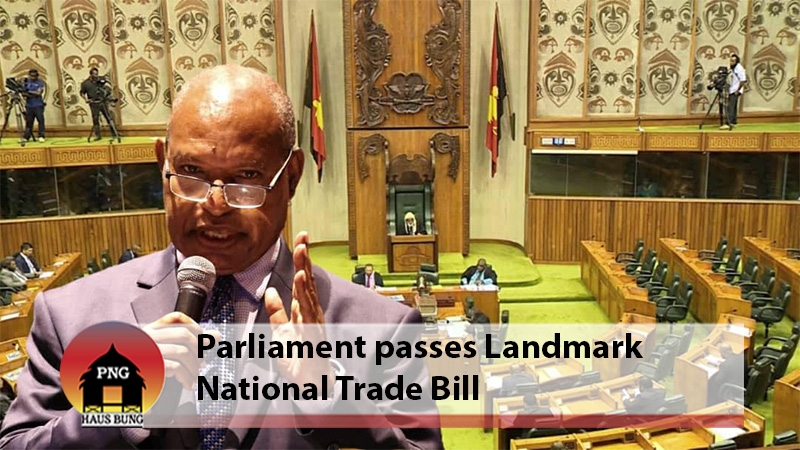The National Parliament passed a landmark legislation yesterday when it unanimously voted for the National Trade Bill 2023.
The bill was presented by the Minister for International Trade and Investment, Hon. Richard Maru who, in 2017 introduced the National Trade Policy and the SME Policy and Master Plan.
Minister Maru said the National Trade Bill 2023 was one of the most important laws in terms of trade and investment because it was set out to achieving the PNG Vision 2050 which specifically notes the importance of diversifying the economy by promoting and expanding trade and investment in the country.
“The Bill seeks to address the need for the anchorage of the trade policy function of the government, as well as giving the legal mandate to the newly established National Trade Office to carry out its powers and functions as envisioned under the Trade Policy.
The Bill serves to clearly define the functions of the Ministry and the trade policy administration which has been lacking since independence,” said Minister Maru.
“For the last 47 years, PNG has been making reactive, uncoordinated, and ad-hoc decisions on trade matters which have resulted in inconsistent, and at times even conflicting decisions on trade issues, duplication of trade roles and responsibilities, and wastage of government resources.
Furthermore, the trade function has been continuously transferred between the Departments of Foreign Affairs and Commerce and Industry, as a division where its activities and programs were not a priority.
These shifts in the Trade function between the Ministries occurred about fourteen times since independence which also resulted in the loss of institutional knowledge and memory, lack of proper coordination in trade negotiations, trade policy formulation and implementation and as a consequence, trade and economic interests of the country being compromised.
This is one of the reasons why our friends from the Pacific are able to export their taro, ginger, and handicrafts to Australia and New Zealand while PNG which represents over 80 percent of the population and landmass in the region cannot get our agricultural and fisheries products into the Australian and New Zealand markets.
This is because they have a coordinating entity with a legal framework unlike PNG,” said Minister Maru.
“PNG’s reliance on a few export commodities for foreign currency earnings and the lack of import substitution on basic food items has caused the unbalanced trade performance that is weakening the country’s GDP growth and our foreign reserves. It is also contributing to the social fall-out that we are seeing where our young people who have their secondary and tertiary education cannot find jobs,” said Minister Maru.
“This is an immediate and urgent call for PNG to have a competent and dedicated office with a clear legal mandate to identify, negotiate and secure new and better market access for our goods and services, and also promote transparency and predictability in trade policy formulation, trade negotiations, and trade policy implementation in the country,” Minister Maru added.
Minister Maru said the National Trade Bill 2023 will ensure that the appropriate linkages are established between all relevant stakeholders both domestically and internationally, for PNG to achieve the National Trade Policy Vision of becoming an internationally competitive export-driven economy, that is built on and aided by an efficient and expanding domestic market.
“In the long term, gains from a robust trade policy and this National Trade Bill 2023 will contribute to alleviating poverty and advance PNG’s social and economic well-being.
Evermore so, trade has been identified by several international organizations such as the World Bank as a tool to respond to and recover from the COVID-19 pandemic going forward,” said Minister Maru.
“The successful enactment of this Bill will be another legacy initiative that demonstrates that the Marape-Rosso Government is serious about its commitment to undertake reforms necessary for PNG’s economic prosperity,” said Minister Maru.

